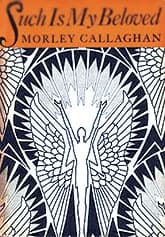Such Is My Beloved
Critique • Quotes
 First edition
First editionFirst publication
1934
Literature form
Novel
Genres
Literary
Writing language
English
Author's country
Canada
Length
approx. 50,500 words
Plain story hides erotic subtext
Such Is My Beloved is the first of three similarly themed novels Morley Callaghan wrote during the 1930s, the other two being They Shall Inherit the Earth and More Joy in Heaven. And unusual novels they are for that era.
While many of his colleagues depicted war, poverty and political movements on big canvases, Callaghan focused on small moral quandaries arising in the Depression, but universal to all times and societies in which injustice exists and personal conscience confronts societal hypocrisy.
Odder still was the religious context in which he placed the battle. In this he foreshadowed later writers, like Graham Greene and William Trevor. Not religious writers by any stretch, but authors ever aware of the success and failures of religious philosophy and institutions to help the afflicted.
Such Is My Beloved is often considered Callaghan's best. It is a novel that sneaks up on you. At first it seems too plain a story, too plainly told. The plot seems rather predictable. An avid young priest finds himself drawn by pity to help two prostitutes. His motives are honourable, but it soon becomes clear some inner uncertainty is pushing him to the point that the girls' welfare becomes a compulsion with him. Meanwhile, eyebrows are raised among his parishioners and in the church hierarchy, which fears a scandal.
What you're tricked into missing
Callaghan's writing through this buildup is always simple and straightforward. He tends to tell directly what the characters are thinking, feeling and expecting, rather than let the reader read between the lines of dialogue and action.
Even when he presents dialogue and speech, it's awash in adverbs—characters talk solemnly, stare mournfully, look down the street carefully, are desperately serious. The result is an overall flatness.
But in the last third of the book, as the fate of the priest starts to unfold as expected, a deeper theme becomes evident. One you finally realize has been there all along but which you were lulled into missing.
I won't give it away entirely but it has to do with the different kinds of love. Bear in mind the title is a reference to "my beloved" of the Song of Songs, the most erotic poetry of the Bible, but which has been interpreted in Catholic tradition as presenting love of God.
But symbolism or allegory has never moved me to appreciate a work of literature—and Callaghan has expressed similar sentiments. The story, the characters, the writing—the feelings and the sensations and the ideas immediately on the page before us—those are the things that move us, not some learned reference to other grand ideas of history or mythology. And there is enough of this good stuff in Such Is My Beloved to make it an affecting, thought-provoking tale on its own.
— Eric
Critique • Quotes

